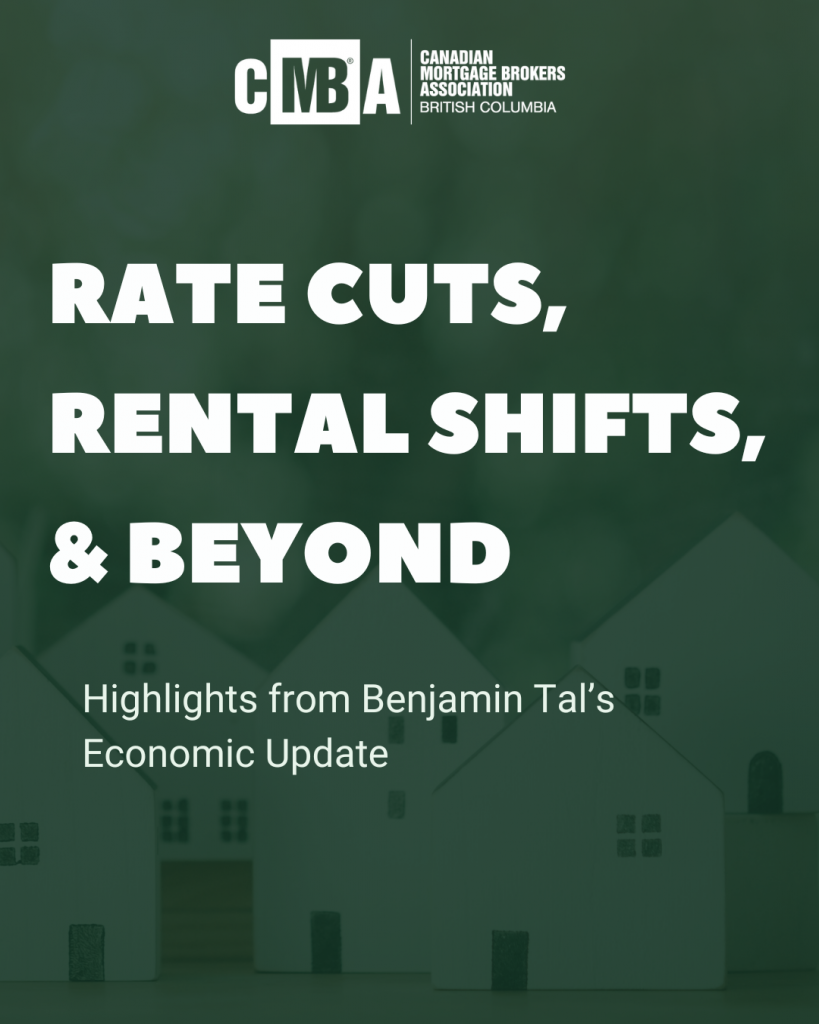 What do housing starts, tariff rulings, and consumer confidence tell us about Canada’s economic trajectory — and what should mortgage professionals be watching most closely?
What do housing starts, tariff rulings, and consumer confidence tell us about Canada’s economic trajectory — and what should mortgage professionals be watching most closely?
On September 10, nearly 400 attendees tuned in to CMBA-BC/MBIBC’s Expert Series webinar, excited to hear the latest market insights from Benjamin Tal, CIBC’s deputy chief economist.
What was expected to be a structured, slide-driven webinar quickly transformed (thanks to a technical hiccup) into a candid, insight-packed Q&A. Fortunately, our fearless host Dustan Woodhouse handled the curveball with total composure, keeping the conversation sharp, relevant, and engaging without missing a beat.
“Despite the technicalities, this was a win,” Dustan says. “The improvisation, real talk, and sharp Q&A made the session resonate deeply with attendees.”
From shifting rental trends to looming rate cuts and payment shocks, this presentation delivered real-time clarity on the forces shaping our market. Check out the highlights below for the key takeaways, sharp insights, and actionable advice that emerged.
Benjamin Tal’s economic insights
Housing starts & rental shift
- The traditional 90/10 split of resale vs. rental starts is now closer to 50/50. In some cities, rentals make up 90% of new builds — this trend is under-reported and should be tracked separately.
- From Dustan: This shift needs to be better communicated to the public. There’s a misconception that “doubling housing starts” means more homes for purchase when, in fact, rentals are dominating.
Tariff impacts
- A Supreme Court ruling on U.S. tariffs could spike U.S. GDP by 1.5%. Canada won’t retaliate; instead, it will feel narrow but deep pain — especially in auto and steel sectors.
- Tariffs are bipartisan now, representing about $320 billion/year in U.S. revenue. They’re not going anywhere.
Consumer confidence over interest rates
- Interest rates matter, but consumer and business confidence are the real drivers. Current uncertainty, particularly from the U.S., is holding back hiring and investment.
- From Dustan: The term “uncertainty” appeared 79 times in the BoC’s last monetary report.
Bank of Canada rate cuts
- Inflation is around 2%, which is not a concern. We’re in a per capita recession. Expect a 50 bps rate cut, likely spread across September and October/November.
Mortgage renewals & payment shock
- About 60% of mortgages will renew by end of 2026. Payment increases will be 10–20% (not the 100% spike once feared).
- Some will see 40–50% jumps, but this affects a small segment and will not be a systemic issue.
- Insolvency rates may rise 20–30%, but from historic lows.
Broker tactics that actually work:
Insights from Dustan Woodhouse
Beyond the economic headlines, this unique session included bonus masterclass in practical broker strategies, courtesy of Dustan Woodhouse. From pinpointing the most responsive hours for prospecting to uncovering overlooked networking goldmines, his advice is rooted in real-world wins and hard-earned experience.
Whether it’s turning a cold call into a cruise or reactivating dormant clients, these tactics prove that small, consistent actions can drive massive results. Here are three key areas of consideration.
1. Prime prospecting hours
- Block 10 a.m. to noon daily for outbound calls — 70% of clients are most responsive during this window.
2. Real-world broker wins
- $2.7 to $33 million in funded volume by consistently calling.
- Broker reconnected with a high school friend → cruise trip → business.
- First outbound call in 15 years → three funded deals.
- One broker re-engaged a client from 20 years ago → secured the client’s son as a new customer.
3. Networking & missed opportunities
- A top realtor recently said no broker has offered to work an open house with her in nine years. This is a huge opportunity left untapped!
“99.66% of your competitors will do nothing. Be the one who does something.”
— Dustan Woodhouse
Final takeaways
Housing market trends
- The condo market is in a recession; purpose-built rentals are surging.
- Landlords and tenants are both fatigued. Corporate landlords are stepping in with better service and facilities.
- Vancouver, long reliant on mom-and-pop rentals, is shifting toward institutional management.
Macro & fiscal policy commentary
- Fiscal stimulus will become the primary economic support.
- Federal deficit could hit $80–100 billion due to housing/military spending (~2.3% of GDP).
- Canadian banks are ultra-conservative — well-equipped for shocks.
- OSFI’s job is to protect the banking system; not individual households.
Huge thanks to Benjamin Tal for his razor-sharp economic analysis and to Dustan Woodhouse for steering the session with clarity, humour, and tactical wisdom. Their combined expertise made this webinar not just informative, but genuinely transformative for mortgage professionals navigating today’s shifting landscape.
Missed the live session?
Members can access the full recording online to revisit the insights, strategies, and standout moments that made this Expert Series one for the books. Log in to you CMBA-BC account and visit Education & Events > Webinars On-Demand to check it out.

